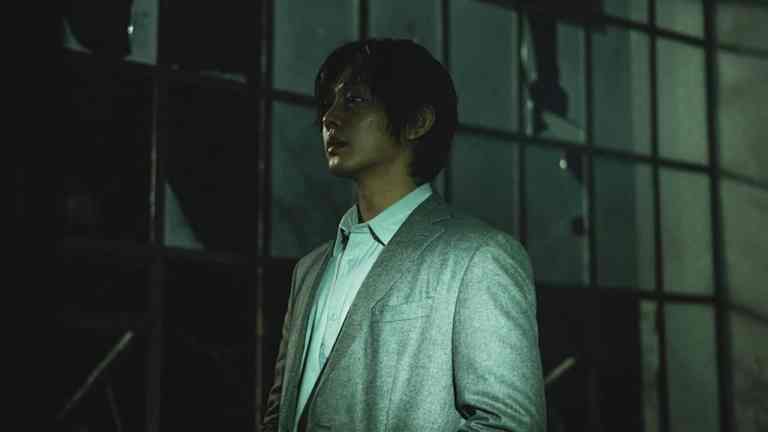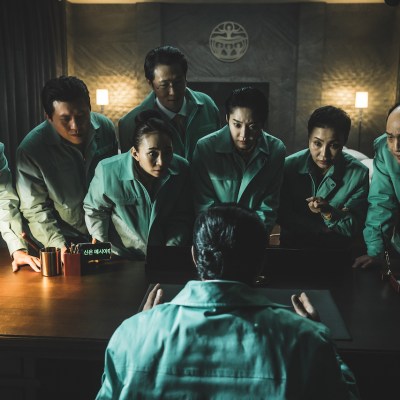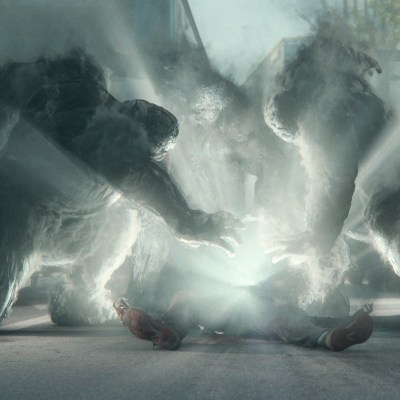Hellbound Time Jump Explained
Hellbound takes some bold storytelling turns, including a major time jump. We break down what it means for the Netflix drama.

This Hellbound article contains major spoilers through Episode 3.
Hellbound creator Yeon Sang-ho may come from a feature film background, but you wouldn’t know it from the six-part supernatural horror series’ impeccable pacing, including a mid-season time jump that gives the drama new narrative life just when the world’s horror is perhaps becoming too much. Whether you’ve completed all six episodes of the Netflix series or are looking for some mid-season guidance following the end of Episode 3, here’s what you need to know…
When is Hellbound Set?
The first half of Hellbound is set in 2023. In Episode 1, it is mentioned that the New Truth Society has been investigating “demonstrations” for a little over 10 years. It is also mentioned that the society was founded in 2012.
How Much Time Passes in the Hellbound Time Jump?
At the end of Episode 3, Hellbound jumps abruptly into the future. In the episode’s final scene (a scene we will revisit in Episode 4), TV broadcaster Youngjae is stuck in traffic. He notices a statue of three demon-monsters outside his car window, and mutters something disparaging about the New Truth. We immediately know that a good chunk of time has passed—at least the amount of time necessary to build a statue and for the New Truth to be well-known enough for a casual, weary mention. Later, we discover four years have passed in that time jump.
What Year is It After the Hellbound Time Jump?
After the time jump, we see a mention of the exact year when Professor Gong returns to Hankuk University where a “2027 Academic Year Kickoff Ceremony” banner is hanging.
The New Truth Society Explained
In Episode 3, we learn about how Jeong Jinsu came to know about the “demonstrations,” and why he decided to create the New Truth Society. Jinsu was abandoned as a child… by his mother… at a carnival. As he tells Detective Jin prior to his death, he lived his life at a Catholic orphanage, following all of the rules so that his mother would come back for him. But she never did, and when Jinsu was a teenager, an angel came to prophecies his death in 20 years.
After that, Jinsu traveled the world looking for answers. He observed different demonstrations, hoping to find a way around his coming death—or at least a reason for it. In the end, he could find none, so he created one. As he tells Detective Jin, he made the unilateral decision for humanity: “If there is no legitimate reason behind this phenomenon, would people be able to accept it? I think they will start rioting and panicking. There has to be a reason. They need to believe that this phenomenon occurs to make the world a better place. They need to believe that it occurs so that justice can be served.”
While Jinsu claims he is doing it for the good of humanity, the argument doesn’t hold much weight. He leaves the New Truth Society in the hands of Pastor Kim Jeongchil, a man who is willing to trade Min Hyejin’s life for the position. We never see Jinsu show any empathy or care for another human, but instead see him gain satisfaction from the manipulation of the people around him. He convinces Heejung to take part in the murder of her mother’s killer, and enjoys lording that fact over Detective Jin.
“I don’t know why god is doing this, but I want every person in this world to feel the same fear as mine,” Jinsu tells Detective Jin, adding: “It’s that fear that will set people free from sin.” But does Jinsu really believe that? Or does he simply feel alone in his suffering, and wants to make other people suffer too? “I’m going to leave the world to your free will,” he tells Jin. But he’s not, is he? He has left Jin a world purposefully shaped to be predisposed against any explanation or philosophy other than that of the New Truth. He has used his time as an adult condemned to die in order to ensure that more people suffer, and feels nothing in the face of that suffering. He has hidden his anger and hate and hunger for power behind the veneer of civility, and called it righteousness.
Why Does Detective Jin Keep Jinsu’s Secret?
You couldn’t have just filmed Jeong’s killing and decided what to do with it later, Detective Jin?
After luring Detective Jin out to the abandoned orphanage that was once his home, Jinsu gives Jin a choice: film his death and show the world. Or keep quiet, and maintain the legitimacy of the New Truth Society. If Jin chooses the former, he may have to indict his own daughter in the process. The murder they performed together is a sin Jin could show to the world to maintain the lie of a logic behind the decrees and demonstrations. “If you do that,” says Jinsu, “the world will remain orderly, and just the way you believe it should be.”
So what does Detective Jin choose? He chooses to protect his daughter. He doesn’t film Jinsu’s death at the hands of the supernatural killers, and he presumably even cleans up the body after the fact. He chooses his daughter’s life over the truth. As Jinsu intended: “Just keep your damn mouth shut about my death until the day you die, and enjoy the world I created for you with Heejung. Be free in it.”
“I’ll leave the world in your hands.”
Does Lawyer Min Hyejin Die?
This answer includes Hellbound spoilers past Episode 3.
Min Hyejin, the Sodo lawyer who tries to help Park Jungja through her demonstration, ends Episode 3 bloody and beaten in a ditch on the side of the road. It is very disturbing. It happens at the hands of the Arrowhead, as ordered by Kim Jeongsil, who is told by Jeong Jinsu that he can be the chairman of the New Truth Society following his death.
While Hyejin certainly seems dead at the end of Episode 3, we later learn she survived the attack, thanks to the sirens of some approaching cop cars. When we see her again, she has a scar on her face from the attack and she has learned to physically defend herself. When the Arrowheads come after her again for her work protecting the decreed, she kicks some serious ass, besting a gang of Arrowhead thugs not once, but twice. Later, she even manages to (somewhat) hold her own against the supernatural creatures who carry out the demonstrations.


